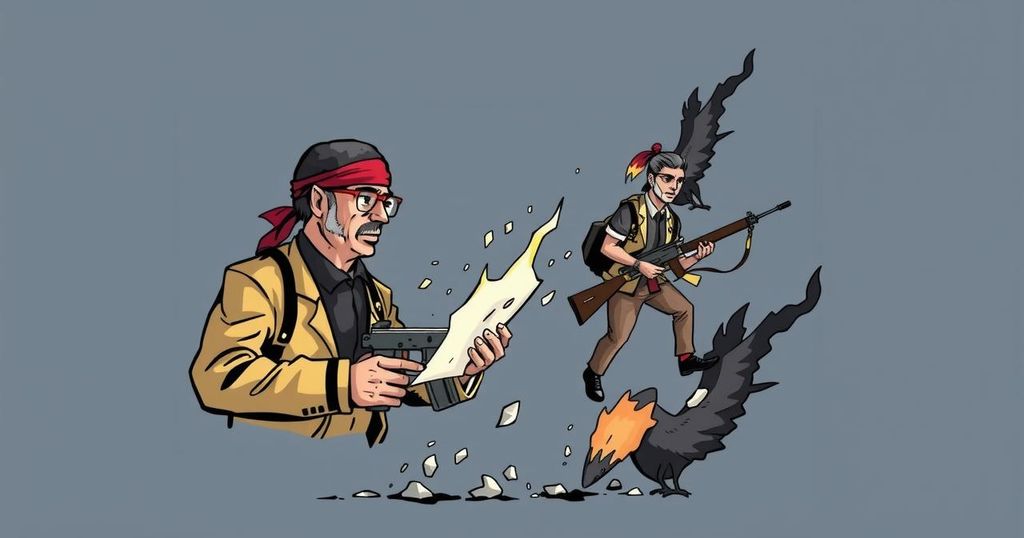Egypt Proposes Two-Day Cease-Fire for Hostage-Prisoner Swap in Gaza
Egyptian President Abdel Fattah el-Sisi proposed a two-day cease-fire to aid in the exchange of Israeli hostages held by Hamas for Palestinian prisoners. This proposal follows renewed hostilities that resulted in numerous Palestinian casualties. The plan seeks to initiate negotiations towards a more permanent resolution after the cease-fire. Meanwhile, the humanitarian conditions in Gaza have worsened, drawing the attention of international leaders.
On Sunday, Egyptian President Abdel Fattah el-Sisi proposed a two-day cease-fire in Gaza aimed at facilitating the exchange of four Israeli hostages held by Hamas for Palestinian prisoners. This proposal emerged during a press conference in Cairo, which saw the participation of Algerian President Abdelmadjid Tebboune. President el-Sisi emphasized the need for negotiations to resume within ten days following the cease-fire’s implementation, with the ultimate goal of reaching a long-term resolution to the ongoing conflict. The announcement comes in the wake of intensified Israeli military operations that have resulted in the deaths of at least 45 Palestinians in Gaza. Negotiation efforts are reportedly taking place in Qatar, with the involvement of senior intelligence officials from the CIA and Israel’s Mossad. As of the time of the announcement, neither Israel nor Hamas had provided an immediate response to the cease-fire proposal. However, a Palestinian official involved in the mediation process conveyed optimism regarding Hamas’s potential receptivity to new offers, implying that the group remains committed to securing an end to the conflict and the withdrawal of Israeli forces from Gaza. Israel has maintained its stance that the conflict cannot be resolved without the dismantling of Hamas as both a military force and governing authority in the Gaza Strip. The ongoing hostilities have escalated since Hamas’s militant actions on October 7 of the previous year, which resulted in the deaths of 1,200 individuals in Israel and the abduction of more than 250 hostages, according to Israeli sources. Data from Gaza’s health officials indicates that United Nations reports estimate nearly 43,000 Palestinian casualties due to Israel’s military actions, which have decimated much of the enclave. An official familiar with the diplomatic negotiations expressed that discussions intend to create a short-term cease-fire in exchange for some hostages held by Hamas. Moreover, the humanitarian crisis in northern Gaza has grown increasingly dire, with UN Secretary-General António Guterres expressing grave concern over the conditions faced by civilians, stating that these circumstances are “unbearable” and highlighting the conflict’s disregard for international humanitarian law. Simultaneously, the Israeli military announced it would investigate an airstrike on a school in the Shati refugee camp that resulted in nine fatalities and numerous injuries, reiterating that its operations are conducted in accordance with international law by targeting Hamas operatives who allegedly utilize civilians as human shields, a position Hamas contests.
The conflict between Israel and Hamas escalated significantly on October 7, 2022, when Hamas launched a surprise attack on southern Israel, leading to widespread casualties and abduction of individuals. In retaliation, Israel initiated extensive military actions in Gaza, devastating the region and resulting in a high number of deaths, particularly among civilians. Amidst these hostilities, various international mediators, including Egypt, Qatar, and the United States, have been engaged in efforts to broker a cease-fire and negotiate the release of hostages. The complexity of negotiations involving Hamas, Israeli military objectives, and humanitarian concerns continues to define the dynamics of this protracted conflict.
In conclusion, Egypt’s proposal for a two-day cease-fire represents a critical initiative aimed at facilitating a hostage exchange amid an intensifying conflict in Gaza. While ongoing military operations by Israel have resulted in substantial civilian casualties, the efforts to resume negotiations suggest a potential opportunity for diplomatic resolution. The situation remains dire, with significant humanitarian implications as international leaders continue to call for adherence to humanitarian laws during this turbulent period.
Original Source: themedialine.org




Post Comment